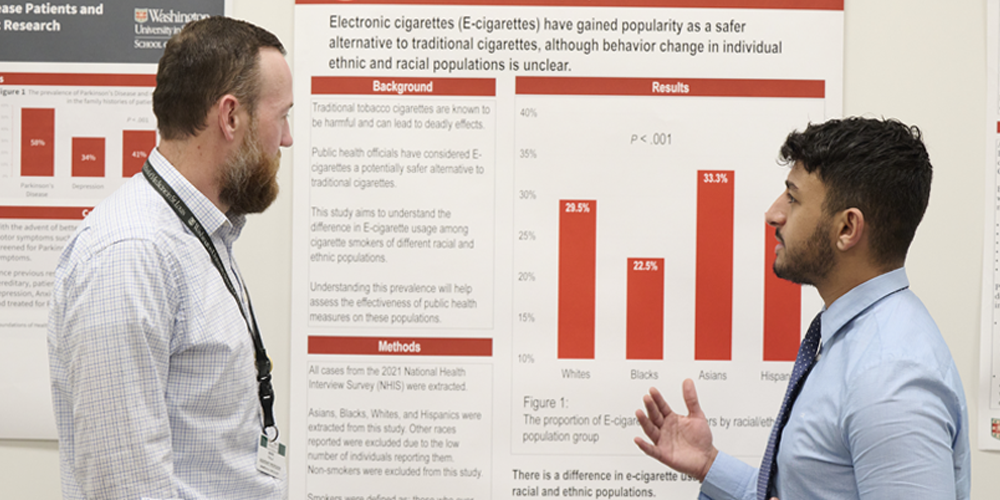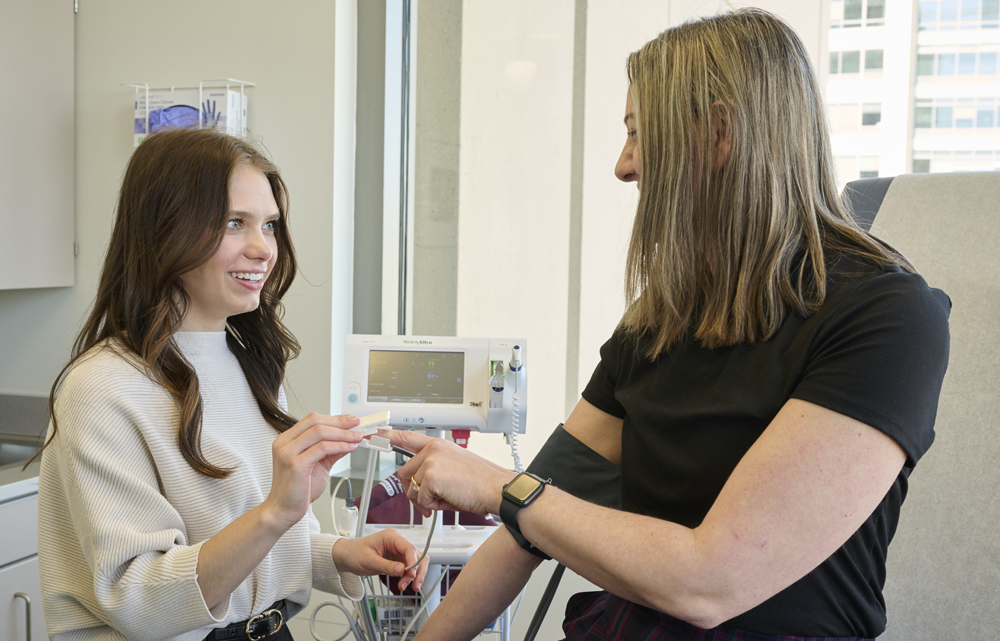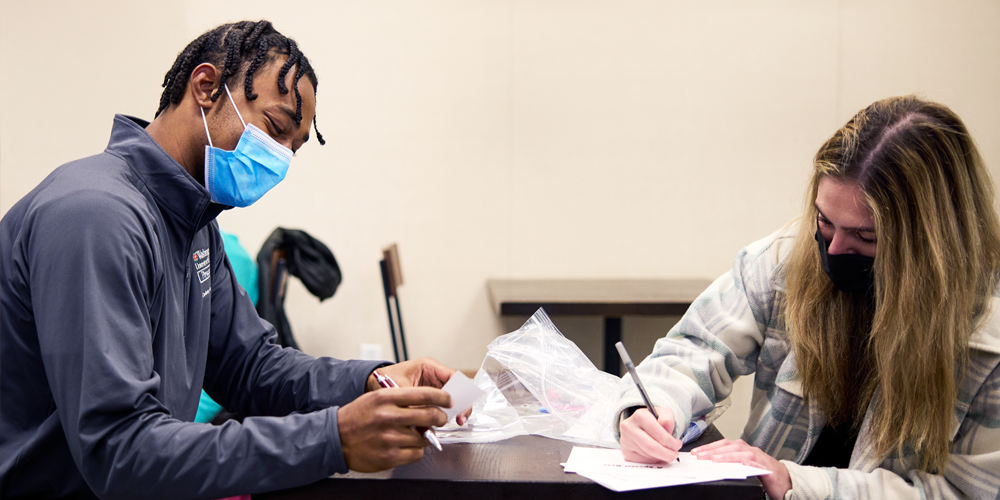PAGE INDEX
What is applied research? | What is an applied research master’s degree? | Why get an applied research degree? | MS in Applied Health Behavior Research | Graduate Certificate in Applied Health Behavior Research | Earn your applied research degree at Washington University School of Medicine in St. Louis | FAQs
What is applied research?

Applied research can take many forms, but one thing is always true: the goal is to solve existing, real-world problems.
In the fields of public health and medicine, applied research seeks to improve health outcomes by implementing effective interventions and their evaluation into standard practice in clinical and community settings.
Unlike basic research, which seeks to acquire or improve a body of knowledge, applied research is focused on the practical implementation of scientific techniques. In fact, applied research is often used to validate the findings and further investigate the outcomes of basic research.
Basic vs. Applied Research
Definition
Basic Research
Investigation into scientific theories for better understanding and prediction of phenomena.
Applied Research
Implementation of scientific techniques in order to solve practical, real-world problems.
Characteristics
Theory-oriented, primarily concerned with the expansion of knowledge
Action-oriented, primarily concerned with the application of research findings
Advantages
Universal in nature and predominantly responsible for breakthroughs in most fields of study
Determines how best to implement research evidence in clinical and community settings
Examples
- Symptoms of anxiety disorders
- How the heart works
- Treatment options for anxiety disorders
- How weight affects heart function
What is an applied research master’s degree?

A master’s degree in applied research provides graduates with the skills they need to develop, analyze and evaluate research trials and programs with the goal of improving health behaviors, outcomes and quality of life.
For graduates with little or no research experience, an applied research master’s degree can serve as a bridge between undergraduate study and their next endeavor, whether it’s medical school, a PhD program, or a career in health promotion in clinical or community settings.
Here’s what you can expect to do in an applied health behavior research graduate program.
Scientific and medical breakthroughs happen daily, but their effect on the population depends on how readily patients and physicians address relevant health behaviors.
Determining how behaviors like exercise, smoking cessation, excessive alcohol use or missed medication affect patient health, and to what degree, is a factor in clinical outcomes that can help doctors, patients, and researchers determine the most effective interventions.
Health differences often reflect societal injustices. Minorities and other underserved groups experience greater difficulty obtaining health care and higher rates of illness and death across a wide range of health conditions.
A lack of diversity in clinical trials has played a significant role in creating these health disparities. Historically, clinical trials have relied almost exclusively on white male study participants, often excluding the groups most affected by a particular disease, condition or behavior. As such, gaps exist in our understanding of diseases and conditions, preventative factors, and the effectiveness of treatments across populations.
In a public health- and medicine-focused applied research degree program, students will seek to reduce health disparities by identifying and reducing barriers to research participation, increasing uptake of health services, and helping communities adopt and maintain healthier habits.
In public health and medicine, applied research seeks to transform the thoughtful knowledge and ideas of basic research into studies and clinical trials that provide evidence to support innovative interventions.
Graduate studies in applied research help students acquire the skills and knowledge to develop those trials, conduct practical research, interpret results, and ultimately use the evidence gained to solve real-world problems at the local and global levels. Whether in a clinical or community setting, these abilities are necessary for the creation, analysis, and management of high-quality health programs.
Why get an applied research degree?

Rising healthcare costs, limited resources, and the need to make evidence-based decisions about program impact on population health are driving demand for researchers skilled in making meaningful use of data collected across diverse settings.
Who should get an applied research degree?
Applied research experience will help you stand out as a prospective medical school or PhD candidate, and give you the edge to advance your career in a variety of clinical or community settings.

For recent graduates, an applied research program is often completed during a gap year before medical school or as a way to gain practical research experience before starting a PhD program.
Medical school admissions become more competitive every year — adding a research master’s can enhance an applicant’s chances of acceptance by fulfilling specific medical and graduate school core competencies.
For those students who lack significant hands-on experience, a research-intensive program often pairs students with faculty researchers to gain experience and exposure to direct research.

For professionals working in clinical and community settings, a graduate research degree program can enhance the knowledge and practical skills needed for career advancement.
Strategies for planning, monitoring and evaluating health education programs bridge students’ existing experience with practical next-level skills and support the improvement of health outcomes in a variety of settings.
Explore WashUMed’s AHBR concentrations and see how you can make the most of your gap year or advance your career.
Master of Science in Applied Health Behavior Research (AHBR) Washington University School of Medicine in St. Louis

Health builds from where we live, learn, work and play — what happens in the doctor’s office is secondary to day-to-day life. Today, more medical care is driven by chronic diseases brought on by lifestyle choices, like smoking, diet and exercise, than acute disease.
With healthcare costs on the rise and limited resources around the globe, the need for researchers skilled in the design and implementation of effective interventions that will improve health behaviors is higher than ever.
Applied Health Behavior Research (AHBR) at WashUMed combines psychology, public health, behavioral medicine, communication science and statistics to promote health and prevent disease. The MS in AHBR is designed for students who wish to gain a wider perspective of how health behaviors impact clinical outcomes.
Curriculum
The MS in AHBR is a 33-credit hour program that provides students with a strong foundation to contribute to the development, management and evaluation of research studies and health behavior programs in academic, clinical and community settings.
Mentored Research
Students in the full or part-time programs of either concentration also have the opportunity to select a mentored research option where they have the opportunity to train under field-leading faculty mentors and learn to solve practical, real-world problems through implementation and evaluation of innovative interventions.
Mentored research experience prepares individuals interested in a variety of health careers or for taking a step toward a medical or doctorate degree. Students can get course credit for up to three semesters (9 credit hours) of mentored research experience. Mentored research is optional for students in either concentration of the MS in AHBR.
AHBR Concentrations
With two concentrations, the Master of Science in AHBR allows students to tailor their graduate education to their specific interests and career goals. Students in each concentration develop a deeper understanding of behavioral medicine and health behavior research, preparing them to share findings across a wide range of academic and hospital settings, nonprofit organizations, government agencies and private industry.
Health Education, Program Planning and Evaluation
Students in this concentration learn to challenge health problems by designing, implementing and evaluating innovative health programs in the public, private and community sectors. Coursework focuses on health behavior theory, program planning, program management, program evaluation and health education.
The Health Education, Program Planning and Evaluation concentration is ideal for students interested in health, medicine, research, and more who want to have careers geared towards community & program evaluation.
Health Behavior Research
Practical research and theoretical knowledge converge in this concentration that prepares students to pursue careers in health-related fields or manage research studies in clinical settings. Coursework focuses on health behavior theory, research methodology, analytic methods and research project management.
This concentration is ideal for students who are interested in health, medicine, research, and more who want to build their knowledge & skills in research coordination, project management, data management, clinical trials and participant recruitment.
Flexible program options
Making room for graduate education in a busy schedule can be challenging for many students. Two flexible program options allow AHBR master’s degree students to complete their degree in a time and format that works best for their lifestyle. If a student’s circumstances change, the format can be switched anytime to suit their new needs.
Want to get your degree in less time?
We offer some flexible hybrid or online courses over the summer and short courses throughout the year, which allows students to complete their degree in as few as three semesters.
Students in the full-time AHBR program may complete 9 to 15 credit hours per semester, and finish the degree within three to four semesters. All courses are offered in the evenings or on weekends so that students may use day-time hours to work, participate in mentored research, etc.
Students in the full or part-time programs also have the opportunity to select a mentored research option where they can be paired with experienced faculty who will help the student develop both theoretical knowledge and practical skills. This option is ideal for students who want to pursue careers in:
- Medicine
- Allied Health
- Psychology
- Public Health
- Research and health-related fields
Students in the part-time AHBR program may complete up to 8 credit hours per semester and benefit from the convenience and flexibility to complete the degree on their own schedule. All courses are offered in the evenings or weekends so that students may use day-time hours to work, participate in mentored research, etc.
Students in the full or part-time programs also have the opportunity to select a mentored research option where they can be paired with experienced faculty who will help the student develop both theoretical knowledge and practical skills. This option is ideal for students who want to pursue careers in:
- Medicine
- Allied Health
- Psychology
- Public Health
- Research and health-related fields

Graduate Certificate in Applied Health Behavior Research
This 15-credit certificate program is designed for graduates who want to develop, maintain, and evaluate health behavior and health education programs. With two concentrations – Health Education, Program Planning & Evaluation and Health Behavior Research, credits earned in the Applied Health Behavior Research graduate certificate can be applied to the Master of Science in AHBR.
Earn your Master’s in Applied Health Behavior Research at Washington University School of Medicine in St. Louis
The WashUMed team are leaders in health behavior and outcomes research. With two concentrations – Health Education, Program Planning & Evaluation and Health Behavior Research – whether your goal is to be a better student, provider, professional or researcher, the MS in AHBR will help you improve your skills and knowledge while preparing you to take the next step in your education or career.

